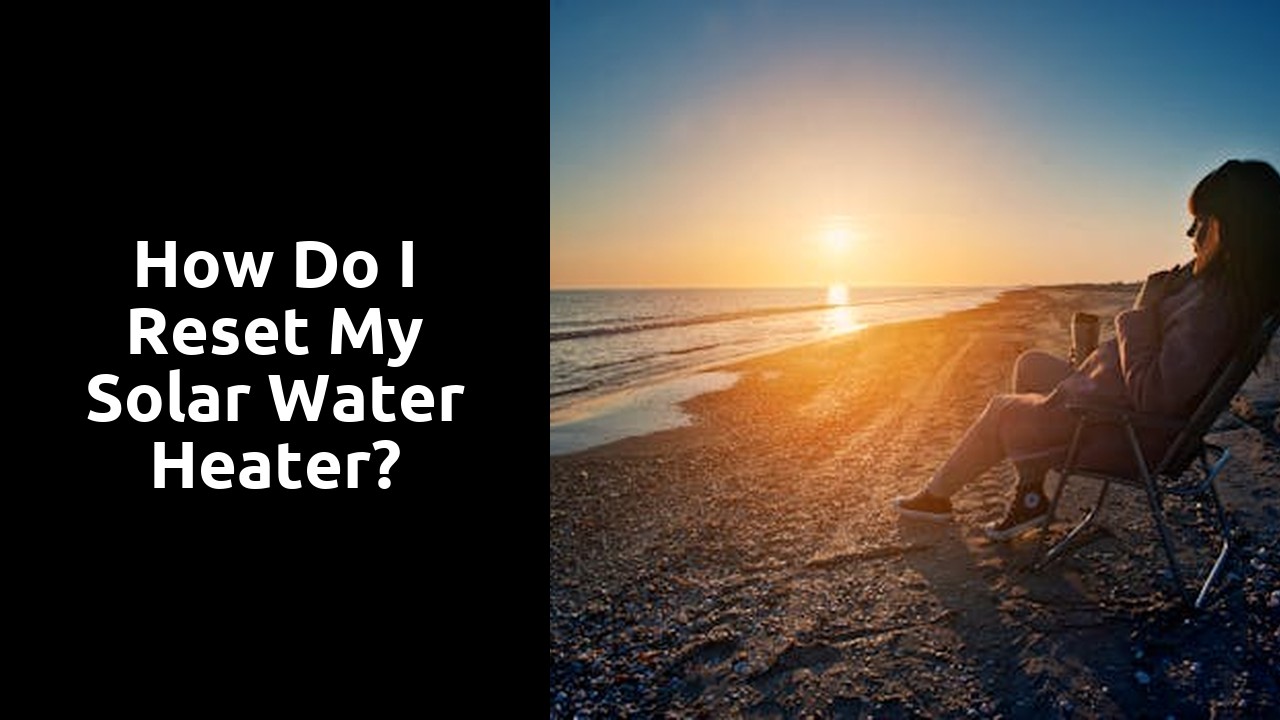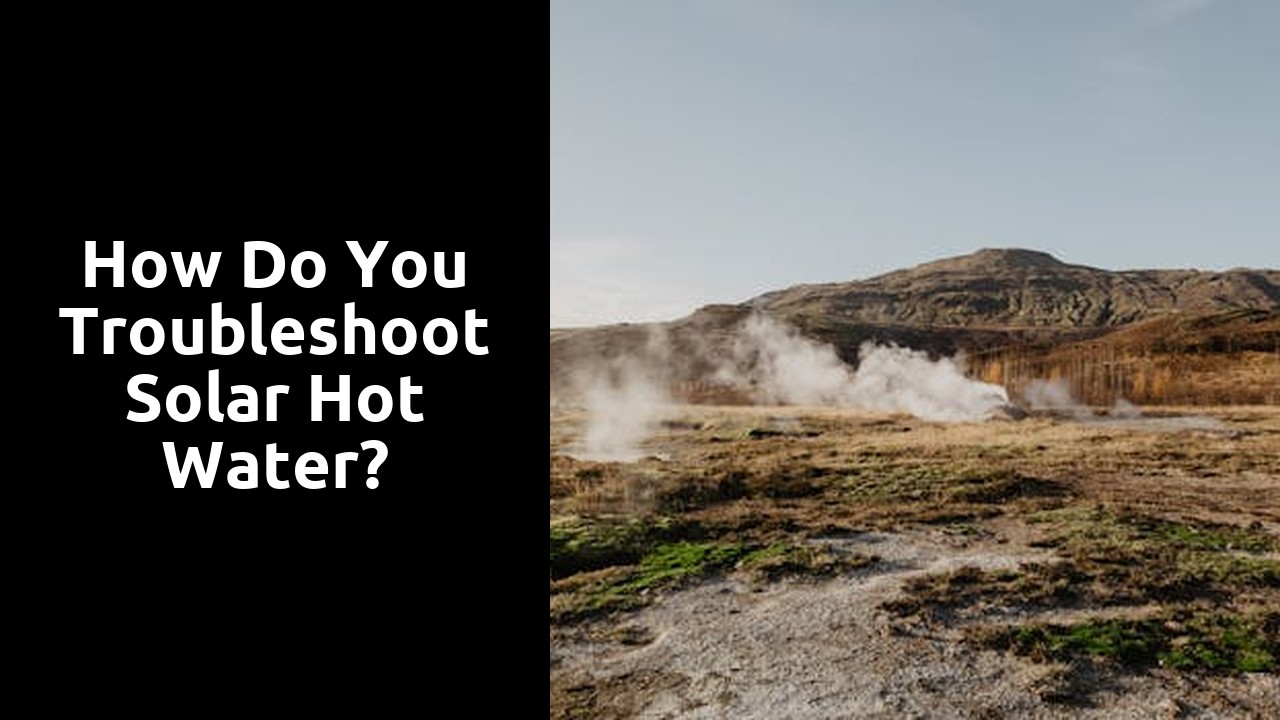
Upgrading Your Solar Water Heater
When considering upgrading your solar water heater, it's essential to first assess the age and condition of your current system. If your solar water heater is outdated or no longer operating efficiently, upgrading to a newer model can bring about significant improvements in energy savings and overall performance. Upgrading your solar water heater can also lead to reduced maintenance costs and a more reliable hot water supply. However, before making any decisions, it's important to consult with a professional to determine the most suitable upgrade for your specific needs and budget. If you are experiencing issues with your current system, such as inconsistent water temperature or low water pressure, seeking advice from a qualified technician can help diagnose and resolve the problem effectively. Solar Hot Water System Troubleshooting can identify any underlying issues and provide recommendations for upgrading to a more efficient model.
Benefits of Upgrading to a More Efficient Model
Upgrading to a more efficient solar water heater model offers several advantages for Australian households. Firstly, these modern systems are designed to harness solar energy more effectively, resulting in increased water heating capacity and reduced energy consumption. As a result, you can enjoy a reliable supply of hot water while lessening your carbon footprint and lowering utility bills. The improved technology in newer models also contributes to a longer lifespan and lower maintenance requirements, providing homeowners with peace of mind and cost savings in the long run.
Moreover, opting for a high-efficiency solar water heater can enhance the overall performance of your household's hot water system. With better insulation, advanced controls, and superior components, these upgraded models can deliver hot water more efficiently, especially during colder months. By investing in a more effective solar water heater, homeowners can ensure a consistent supply of hot water for their daily needs without experiencing issues such as Solar Hot Water System Troubleshooting.
Seeking Professional Help
If you encounter persistent issues with your solar hot water system despite attempts to troubleshoot, it may be time to seek professional help. A qualified technician can diagnose the problem accurately and recommend the appropriate solutions to get your system back up and running efficiently. They have the expertise to identify underlying issues that could be affecting the performance of your solar water heater.
When facing complex problems with your solar hot water system that you cannot resolve on your own, professional assistance is essential. Expert technicians have the necessary tools and experience to tackle a wide range of issues related to solar hot water systems. By calling a technician specialised in Solar Hot Water System Troubleshooting, you can ensure that any underlying problems are addressed effectively, restoring your system's functionality and optimising its performance.
When to Call a Solar Water Heater Technician
When it comes to solar hot water system troubleshooting, there are times when calling a qualified technician is necessary. If you find that your solar water heater is not producing hot water despite receiving adequate sunlight, it might be time to seek professional help. Similarly, if you notice leaks, strange noises, or a sudden increase in your energy bills, a technician can diagnose the issue and recommend the necessary repairs.
Attempting to fix complex issues with your solar water heater without the proper expertise can lead to further damage and potentially void your warranty. A trained technician has the skills and knowledge to identify and rectify problems efficiently, ensuring that your solar water heater continues to operate optimally. Remember, regular maintenance and timely repairs can enhance the longevity and performance of your solar hot water system, making it a worthwhile investment for your home.
Maximising the Efficiency of Your Solar Water Heater
One key aspect of maximising the efficiency of your solar water heater is to regularly inspect and maintain the system. This includes checking for any signs of leaks, ensuring that the solar panels are clean and free from debris, as well as ensuring that all connections are secure. By conducting routine maintenance, you can prevent minor issues from escalating and help your system operate optimally for a longer period.
Another way to boost the efficiency of your solar water heater is to monitor its performance regularly. Keep an eye on the temperature of the water, the pressure levels, and any unusual sounds coming from the system. By being proactive in identifying potential problems early on, you can address them promptly and potentially avoid larger issues down the track. Remember, proactive maintenance is key to a well-functioning solar hot water system. Troubleshooting when needed can save you time and money in the long run.
Tips for Improving Performance and Longevity
To ensure the optimal performance and longevity of your solar water heater system, regular maintenance is paramount. It is advisable to check the solar panels for any debris or dust accumulation, as these can hinder the absorption of sunlight. Additionally, checking and cleaning the water pipes and connections will help prevent blockages and maintain efficient water flow. Furthermore, monitoring the overall functioning of the system, including the pump and controller, can help identify any issues early on and prevent potential breakdowns.
In case you encounter any issues with your solar hot water system, referring to a Solar Hot Water System Troubleshooting guide can be highly beneficial. This guide typically includes common problems and their corresponding solutions, enabling you to troubleshoot minor issues independently. However, for more complex problems or if you are unsure about the troubleshooting process, it is recommended to seek professional assistance. By keeping up with regular maintenance and promptly addressing any issues, you can maximise the efficiency and lifespan of your solar water heater system.
FAQS
How do I reset my solar water heater?
To reset your solar water heater, you can start by turning off the power supply to the system and then turning it back on after a few minutes. This simple reset can often help resolve minor issues with your solar water heater.
What should I do if resetting my solar water heater doesn't work?
If resetting your solar water heater doesn't solve the problem, you may need to seek professional help. A qualified solar water heater technician can diagnose the issue and provide the necessary repairs or maintenance.
Can I upgrade my solar water heater for better efficiency?
Yes, you can upgrade your solar water heater to a more efficient model. Upgrading can lead to benefits such as increased energy savings, improved performance, and reduced environmental impact.
When should I call a solar water heater technician?
You should consider calling a solar water heater technician if you notice a significant drop in performance, unusual noises, leaks, or any other signs of malfunction. Regular maintenance checks are also recommended to prevent potential issues.
How can I maximise the efficiency of my solar water heater?
To maximise the efficiency of your solar water heater, you can follow some tips such as ensuring proper insulation, regular cleaning of solar panels, setting the right temperature, and scheduling routine maintenance checks.
Are there benefits of upgrading to a more efficient solar water heater?
Upgrading to a more efficient solar water heater can bring several benefits, including lower energy bills, reduced carbon footprint, increased reliability, and improved overall performance.
What are some tips for improving the performance and longevity of my solar water heater?
Some tips to improve the performance and longevity of your solar water heater include keeping the solar panels clean, checking for leaks regularly, adjusting the settings based on weather conditions, and scheduling professional maintenance at least once a year."""
